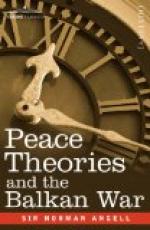It should be to our everlasting glory that our political thought in the past, some of our political institutions, parliamentary government, and what not, have had an enormous influence in the world. We have some ground for hoping that another form of political institution which we have initiated, a relationship of distinct political groups into which force does not enter, will lead the way to a better condition of things in Christendom. We have demonstrated that five independent nations, the nations of the British Empire, can settle their differences as between one another without the use of force. We have definitely decided that whatever the attitude Australia, Canada, and South Africa may adopt to us we shall not use force to change it. What is possible with five is possible with fifteen nations. Just as we have given to the world roughly our conception of Parliamentary Government, so it is to be hoped may we give to the world our conception of the true relationship of nations.
The great steps of the past—religious freedom, the abolition of torture and of slavery, the rights of the mass, self-government—every real step which man has made has been made because men “theorised,” because a Galileo, or a Luther, or a Calvin, or a Voltaire, Rousseau, Bentham, Spencer, Darwin, wrote and put notes of interrogation. Had they not done so none of those things could have been accomplished. The greatest work of the renaissance was the elimination of physical force in the struggle of religious groups, in religious struggles generally; the greatest work of our generation will be elimination of physical force from the struggle of the political groups and from political struggles generally. But it will be done in exactly the same way: by a common improvement of opinion. And because we possess immeasurably better instruments for the dissemination of ideas, we should be able to achieve the Political Reformation of Europe much more rapidly and effectively than our predecessors achieved the great intellectual Reformation of their time.
CHAPTER VIII.
WHAT MUST WE DO?
We must have the right political faith—Then we must give effect to it—Good intention not enough—The organization of the great forces of modern life—Our indifference as to the foundations of the evil—The only hope.
What then must we do? Well the first and obvious thing is for each to do his civic duty, for each to determine that he at least shall not reject, with that silly temper which nearly always meets most new points of view, principles which do at least seek to explain things, and do point to the possibility of a better way.
The first thing is to make our own policy right—and that is the work of each one of us; to correct the temper which made us, for instance, to our shame, the partners of the Turk in his work of oppression.




